Dashlane is a popular tool for password management among users, garnering good customer reviews. Thanks to its impressive features and performance, Dashlane often appears among the best password managers available today.
In essence, Dashlane offers end-to-end encryption to protect users’ data. Plus, it has a broad selection of features that make it a high-security option. It also includes more helpful features than any other product in the market. So even if you go by price alone, you’ll notice it offers better value for your money than any other option.
But does this all suffice to make this tool worth using? Let’s learn all about this password manager through this unbiased review of Dashlane.
Dashlane password manager review: The quick facts
| Our rating | 7/10 |
| Encryption | AES 256-bit encryption |
| Pricing | $3.33/month |
| Customer support | Live chat support, email, phone support, and aritlces |
| Money-back guarantee | No |
Dashlane pros and cons
- Does not have desktop applications but has easy-to-use mobile applications and browser extensions
- The application has a password generator feature that helps you generate strong and unique passwords and keeps them in a secure vault
- Uses proprietary end-to-end encryption technology to protect your passwords from unauthorized access
- Has a free plan and a paid plan that comes with a 30-day money-back guarantee
- Has a reliable customer support team ready to answer your questions promptly
- The app has a handy feature that allows you to automatically update old and weak passwords with strong, unique, and credible ones
- Fails to supply login details for some websites consistently
- Has limited storage capacity compared to its competitors
Dashlane password manager overview
The firm behind the Dashlane password manager emerged in 2009, eventually launching its dedicated password management tool in 2012.
Initially, the tool arrived with AES encryption to protect users’ data with a single master password. But as the software gained popularity, it introduced new features such as multi-factor authentication, password generation, and even a VPN.
Today, Dashlane’s broad array of valuable features is beyond what any other product offers in the password manager industry.
The software performs at every level. The most basic password management functions are top-notch and integrate seamlessly into your digital experience –auto-saving, auto-filling across all operating systems, browsers, and devices. Of course, these are the things that every password manager worth the name should do correctly (which is not the rule, unfortunately). Dashlane outperforms every competitor in each of those essential features.
But there’s more. It comes with a good VPN, live dark web monitoring, and an automatic password changer. If the crucial elements in Dashlane already make it the best option, those extra features put it in a category above the rivals.
Is Dashlane secure and private?
Privacy – zero-knowledge data management
Dashlane uses industry-standard data management principles certified by world-leading security standard organizations. Its patented Zero-knowledge policy in the industry ensures total privacy to your vault – not even Dashlane employees can access your stored data.
The applications are also SOC 2 Type 2 and GDPR/CCPA compliant. GDPR/CCPA certification requires Dashlane to keep your data private and secure without the possibility of selling or sharing it with a third party. SOC 2 certification basically shows you can trust Dashlane’s data management principles.
Secure communications
How does Dashlane secure data in transit between your device and Dashlane servers? Well, the application masks your transmissions through encrypted HTTPS routes. Also, it implements standard internet traffic encryption using TLS and SSL to secure your data requests.
Users on the Business Plan package get to enjoy the Single Sign On (SSO) feature with any SAML 2.0 IDP. This is a convenient feature as it allows you to sign in to your accounts without necessarily entering your master passwords. Dashlane also has account recovery services for business account holders, where users can request a master password reset on an authorized device.
End-to-end encryption
Dashlane uses the military-grade AES-256 encryption algorithm to store your passwords securely. Also, it uses a secure end-to-end encryption technology whereby encryption is done on the local device, and only you can access the information with your chosen master password.
The decryption key is impossible to guess since it is computed with Argon2d/PBKDF2. Argon2d and PBKDF generate brute-force resistant keys uncrackable by even the most advanced dictionary attacks. This means no one can access information stored in your secure vault without proper authorization.
Multiple-level of top-grade security
Dashlane adopts high-level security measures to protect your passwords, documents, and other sensitive information. The entire security infrastructure is guided by a zero-knowledge principle that ensures even the Dashlane employees cannot access your stored data.
The application employs different layers of encryption to render your data unreadable. It uses robust encryption algorithms like PBKDF, AES-256-bit, and SSL/TLS connections. In addition, Dashlane supports two-factor authentication and offers biometric login methods like Fingerprint and Face ID. These features are almost impenetrable by cyber criminals, so you can rest assured that your data is safe.
Dashlane security features
Your password vault in Dashlane is protected via robust, military-grade AES-256 bit encryption.
All your data storage occurs at the local level. That means that all the passwords (and other sensitive information you store in Dashlane) are right there on your hard drive and not on the company’s servers. So, if the Dashlane network ever suffers a breach, your data will remain immune.
And even if your computer gets lost or stolen, the data is still unreadable because it’s encrypted — don’t forget to back up your Dashlane things frequently.
One of Dashlane’s policies is the zero-knowledge protocol. As a result, the company knows nothing at all about you and your passwords. Only you can access your Dashlane vault as even Dashlane can’t access any of your data. (While it’s great for privacy, it also means that if you lose your master password, Dashlane can’t help you recover your account. So be careful with your master password.)
But it doesn’t mean that Dashlane lacks any account recovery option. For example, if you have Dashlane on your Android or iOS device and have biometric logins enabled, you can reset your master password without any problems. This is similar to other popular password managers, such as LastPass, which supports account recovery via biometric logins, SMS, and one-time recovery passwords.
More additional security features in Dashlane include:
- Two-factor authentication (2FA).
- Password security auditing.
- Secure password sharing.
- Virtual Private Network (VPN).
- Real-time dark web monitoring.
- Emergency access.
These features are also available in 1Pasword, LastPass, or Keeper (2FA, password security auditing, and secure password sharing). But Dashlane stands out by offering real-time dark web monitoring and emergency access. It’s also unique because the license includes access to a VPN, which is as good as many standalone VPN services.
Password Vault
Dashlane has recently announced transitioning to a web-based password manager. So, while the desktop apps will continue working even after the web app becomes functional, they won’t receive updates.
Nevertheless, you can keep using the desktop version for as long as you want. In fact, for now, if you’re going to take advantage of all Dashlane features, try using both the web and the desktop applications simultaneously.
This won’t be complicated as the interface in both versions looks similar. In addition, both options give you the ability to store passwords and secure notes (such as legal documents, WiFi passwords, software licenses, and other sensitive data). However, storing IDs (passports, voter cards, social security cards, and driver’s licenses) is supported only in the desktop version.
Although Dashlane offers detailed entries, it still lags behind Bitwarden or LastPass when creating fully customized entries.
Another exciting feature in Dashlane is the automatic password changer feature. With one click (or tap on your phone’s screen), Dashlane will log into any supported sites and change your password. The supported websites include Discogs, EasyJet, FlightAware, IMDB, Vimeo, Reddit, and many more.
Moreover, Dashlane can change your passwords at many sites simultaneously. (LastPass and Norton password managers also do instant password changes, but Dashlane works better.)
Yes, some exceedingly popular sites do not currently support Dashlane’s password changer. But the feature remains helpful, and the supported website list keeps growing.
Unfortunately, this option is available to desktop users only, but it will soon become available on the web app.
Another problem worth mentioning in this Dashlane extensive review is the lack of the ability to organize the passwords into separate folders. But the lack of folders or additional customization isn’t a deal-breaker.
Two Factor Authentication (2FA)
Enabling 2FA makes you go through the second form of authentication every time you log into your Dashlane account or each time you log into the password vault from a new device.
Interestingly, Dashlane offers various two-factor authentication (2FA) options that include:
- Authenticator app (Google Authenticator, Duo Mobile, Authy, etc.).
- U2F security key (authentication using a USB key such as FIDO or YubiKey).
You can only enable or disable the 2FA option from the desktop app. But it will be available on the web app soon. This brings us to a heads-up: once Dashlane becomes a fully web-based app, the 2FA with a USB security key won’t be supported anymore. (In contrast, LastPass is also web-based but still supports 2FA with a YubiKey).
Besides, Dashlane also supports backup codes for 2FA that let you access your password vault without the 2FA authenticator app. You can generate these codes right after enabling 2FA. You can also receive them on your phone if you integrate your number with Dashlane.
In addition, this tool offers tremendous support for biometric logins on separate devices. Specifically, the Touch ID is available for Android devices and Face ID for Apple ones. Windows users can use a fingerprint scanner, and Mac users can use their touch bar for Touch ID. (However, Windows and Mac users may soon have to lose the biometric login feature.)
Also, you can find the convenient time-based one-time password (TOTP) feature with Dashlane. Its TOTP generator syncs all your OTPs with every device you use and shares them when sharing logins.
Password generator
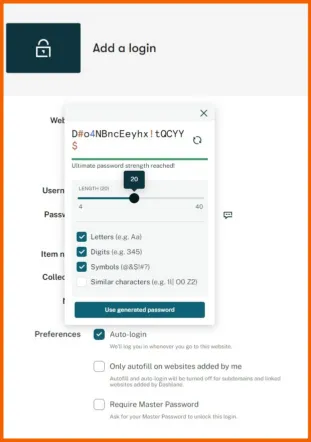
The password generator in Dashline is straightforward to use. It works perfectly and gives you passwords comprising numbers, letters, symbols, and similar characters (like S and 5). You can use the password generator in either the desktop or mobile apps, or the browser extension, and it will show up automatically as you create a new account.
By default, the Dashlane password generator in the desktop app creates 12-character long passwords. If you want a longer password by default (16 characters), you can use the browser extension or the mobile app instead. Generally, you can create custom-sized passwords between 4 and 40 characters.
The default password length in Dashline is similar to the other tools. However, the difference lies in the maximum character limits. For example, Dashlane’s largest password can be 40 characters. On the other hand, LastPass and Sticky Password can give you a 99-character long password; Bitwarden can even go as long as 128 characters.
Dashlane can also get you a random string of numbers, symbols, and letters.
An impressive thing about Dashlane’s password generator is that it shows you a list of all passwords generated previously. It’s a helpful feature when you need a backup or your auto-save is turned off when creating passwords. While it is rare in similar products, Dashlane has it in the browser extension.
Password sharing

We are not crazy about password sharing, of course. But sometimes, there is no way around it, and if you’re going to do it, you better do it safely and easily. And Dashlane delivers on both accounts.
Sharing a password with somebody is as simple as entering an email address and picking if you want them to have limited or full rights. In the first case, the recipient will be able to use the password (but not see it). In the second option, they will know the password and do everything you can also do with the account in question.
You can revoke the recipient’s access to any shared password at any time you want.
The number of accounts you can share depends on the plan you pick. The free version allows sharing of only five accounts. The Family and Premium packages have no limitations. Dashlane’s approach to this issue is generous. Most other password managers don’t even offer this option, and those few that do will let you share only one password at a time.
However, what disappoints here about Dashlane’s password sharing is that Family users can’t create shared vaults (something they can do with LastPass and 1Password, for instance). This is no big deal, but it would be a convenient addition for the future.
Password health checker
The Dashlane’s Password Health Checker is a tool for password auditing. It scans your saved accounts to find weak, reused, or compromised passwords. Also, it will give you an overall password health score.
It isn’t a unique or revolutionary feature. Almost every competitor has a similar feature. But it does the job very well –you can even pick the accounts you want to exclude from the total health score.
If you’re the type of user who currently has the same password on several accounts, Dashlane will give you a low score regarding password health. Moreover, you’ll have to change the repeated passwords by hand. (The automatic password change tool won’t do the trick in this case, but maybe it could when it’s on the web app).
The Password Health feature is a good tool that will help you ensure that all of your passwords are secure. It’s robust, intuitive, and it works well.
Virtual Private Network (VPN)
While several anti-virus suits offer VPN services of varying qualities, no other password manager will give you a VPN with your package. We found it the most impressive feature while testing Dashlane for this review.
Dashlane’s VPN is powered by one of the most popular VPNs on the internet: Hotspot Shield. It encrypts network traffic with AES-256 (like all the best VPN services available today) and implements a zero-logs policy.
Dashlane’s VPN has no data caps, so you can use as much bandwidth as you want. This is rare among VPN services that come as a side feature, such as security suites. For example, Kaspersky’s and Panda’s VPN limit the user traffic in their VPNs to 300 and 150 MBs daily, respectively.
The VPN includes servers in over 80 countries. All servers function well and provide fast speeds so that you won’t notice the encryption and traffic tunneling in your digital experience.
Also, this VPN is good enough for playing games, downloading files, watching video streams, and torrenting. So it can compete with most of the best-paid VPNs regarding speeds and functionality.
But if you want some more advanced features like a kill switch, you will still need to get an account with a top-notch provider such as NordVPN.
Dark web monitoring
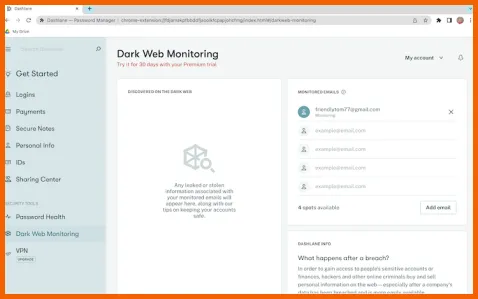
The dark web monitoring feature keeps scanning the dark web looking for your email address and other sensitive data. If such information finds its way into the internet’s dark side (as part of a data breach), it will find it and let you know it’s there instantly.
The dark web surveillance is online on a 24/7 basis, and it can search for up to five email addresses.
Most password managers do not offer dark web monitoring. The few who do, don’t really do their own tracking but rely on a third-party free database to do the job.
Dashlane collects its own data from the dark web. It keeps records from many data breaches, adding about a million new items daily. Also, most competitors do their “scanning” on demand. Not Dashlane. It keeps an eye out for you all the time, and it will alert you instantly if it finds something.
When your data is there on the dark web, how does Dashlane know it? We’re glad you asked.
We fed one of our test emails to Dashlane’s dark web monitoring feature to test this feature. Here’s what it found:
The email address in question got leaked four times. Dashlane told us the websites related to each data breach, the dates on which they happened, and the types of data circulated. Once Dashlane found that email address on the dark web, it suggested changing all the passwords to the affected websites. We did change the passwords, after which the breach became “solved.”
Emergency access
This feature lets you pick a contact you trust. Then, that contact will be able to access those secure notes and passwords you pre-determine if there’s an emergency.
All you need to do is to provide that person’s email address. Then, if they accept, they will have access to the items marked for an emergency when the waiting period finishes or when you approve the request.
The waiting period can be anywhere from right now to 60 days. (You can set things up so that your emergency contact gets access only after you’ve answered their request).
Dashlane will notify you when the emergency contact tries to access your password vault. You can then choose if you grant the access. However, you must answer before the pre-set waiting period is gone. Otherwise, the emergency contact will get access to the emergency items.
Keep in mind that your emergency contact won’t be able to gain access to payment information, personal information, or IDs.
Although, it isn’t an uncommon feature with password managers. But what makes Dashlane surpass others is that it lets you mark items you prefer to keep private.
Another weakness in Dashlane’s emergency access is that it’s not available in mobile apps. Instead, emergency access requests can only be answered via the desktop application. However, the good news is that the company plans to bring this functionality to mobile apps shortly.
So, while testing the tool for this honest review of Dashlane, we found its emergency access feature impressive and more versatile than the competitors. However, it could improve for sure, and we will be delighted to see it expanded into mobile apps as soon as possible.
Passkeys
Dashlane is one of the few password managers offering passkey support. Passkey is a convenient tool that makes the authentication process more secure and quicker by eliminating the need for creating complex passwords.
For a passkey to work, you must be accessing a passkey-compatible website. It takes the login details from the website and generates private and public keys. The private key is stored securely in your Dashlane application, while the public key is sent to the website server you are registering on. Both keys are mathematically related and are used for authentication without filling in login credentials.
You can install Passkey as a browser extension, and it is compatible with Firefox and all Chromium-based browsers like Edge, Opera, and Chrome. I tested the passkey browser extension on Chrome with a passkey-compatible website and was able to generate a passkey and log in successfully several times. The feature is also supported in the Dashlane Android version.
Browser extensions
Dashlane has an incredible browser extension fully packed with valuable tools. The extension allows you to navigate to different websites, change settings, save and autofill logins, generate passwords, and access saved passwords.
During my tests, I was impressed by the auto-log, auto-fill, and auto-save features. They allowed me to auto-fill login forms and automatically logged me into various websites. Surprisingly, it auto-filled all my payment details too in the payment forms. I could turn off these features successfully and log in by entering details manually.
Additionally, you can access all Dashlane features by opening the web application directly from the browser extension. Some of the available main features include a password health checker, dark web monitoring, and Dashlane VPN.
Dashlane secure notes
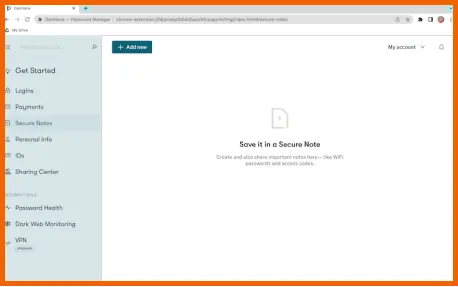
The secure notes feature is a secure vault where you can store your sensitive information like software licenses, Wi-Fi codes, ID scans, etc. The good thing is that you can access these documents from different devices.
The application has pre-set options to store the following;
- Software licenses
- Server information
- Membership
- Legal documents
- Finance
- Database
- Application password
In addition, you can create blank notes and upload any document that you would like to store securely. However, you must be on the paid plan to access the 1 GB storage space, which may not be enough for some users. Again, some competitors offer larger storage spaces at a cheaper price. Once you have stored your documents, you can securely share them with friends or send them to your phone.
Advanced form-filling
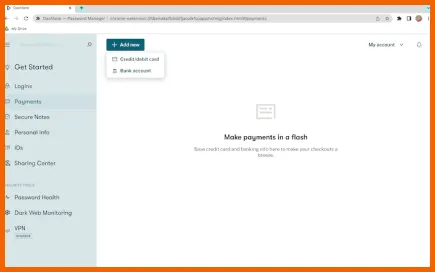
Dashlane has an amazing feature that auto-fills your personal details in web forms. This includes basic information like phone number, address, email, and name. The details are stored in the application; you can store as much information as you wish. In the future, you can use Dashlane to populate a web form with the details you have already stored.
This password manager allows you to add payment information on the main menu. Here you can store payment details like bank accounts, credit cards, and PayPal accounts.
Additionally, the application has a section where you can store identification documents like passports and driver’s licenses.
Capturing logins
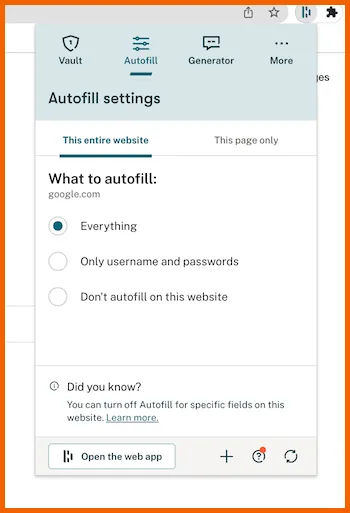
Besides allowing you to import stored passwords from browsers and other password managers, Dashlane captures and stores your login credentials for single and multi-page web applications.
You can tweak your settings to;
- Disable the capture logins feature
- Only complete the autofill
- Fill in credentials and login automatically
However, you must manually enter your credentials for the second or third login in multi-page websites. Just click on the Dashlane logo and select the right login details. We hope this minor inconvenience can be fixed in future.
Dashlane setup and user-friendliness
Dashlane is an easy piece of software to set up and use. What’s alluring here is that you can even use the Dashlane password manager for free. However, the transition from a desktop app to a web-only application has confused the users.
If you find yourself at the Dashlane website and you click on “Get Dashlane,” you’ll arrive at the web store so you can install the Dashlane web extension. But, going this way won’t let you have every Dashlane feature available. Instead, you’ll have to use the desktop application for that.
The problem with this scenario is that there’s no heads-up for new users. Nobody will tell you that you need to download and install the desktop app as well unless you already know which features you want to have and if they’re not in the web version. The website won’t prompt you to download the desktop application too.
Even worse, you won’t find a link to download the desktop app within the official site. For that, you’ll need to click on “My Account” at the bottom left corner of the web app, then “More features,” and then “Download.” Again, this is too hidden for a thing you should have right away as a Dashlane user.
Besides, how Dashlane is managing the transition to a web-only service is rather disappointing. There’s little point in forcing new users into the web-only option while developing hasn’t brought all the features online –let alone that some of those missing elements in the website are among the most important.
The good news is that we’re at a transitional stage. Dashlane will complete the transition to the web soon. And when the web app is fully developed, we do not doubt it will be the best.
Dashlane browser extensions
The Dashlane browser extension is available for Google Chrome, Mozilla Firefox, Microsoft Edge, and Safari. Opera and Brave can also use it because they are Chromium-based.
The extension will show you all your saved items, allow you to generate new passwords, save new passwords, and autofill logins and forms. During our review, Dashlane’s auto-save, autofill, and auto-log functions worked fine in every test performed over several operating systems and browsers. And you can turn off the auto-save or disable auto-fill for specific websites.
You can also launch the web app from the Dashlane browser extension. There you can import your passwords from Chrome, Edge, Firefox, 1Password, and LastPass. The process starts by exporting those passwords as a .csv file, then loading it into Dashlane. It’s a swift and frictionless process that will take you fewer than two minutes.
Dahline is a superior product in terms of functionality. Plus, it’s also well-designed and one of the most intuitive password managers out there. You’ll learn where everything is after only a few sessions, and it will be effortless for you.
Dashlane mobile app
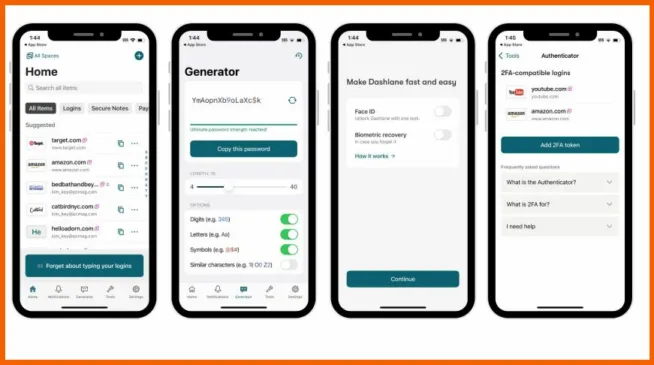
The mobile app comes in both Android and iOS flavors. It gives you most of Dashlane’s functionalities, is easy to use, and delivers on all its promises.
The first thing that Dashlane will ask you after you download the app is whether you want to use biometrics to access your password vault and as an account recovery option if you lose your master password.
After that, you’ll go through a short but illuminating tutorial on using the mobile app. Then, you will have your full password vault and every feature available to you.
Here’s what the Dashlane mobile app can do for you:
- Viewing everything you’ve saved in your password vault.
- Generate passwords.
- Save and auto-fill passwords.
- Share passwords and secure notes.
- Check for any of your passwords’ strengths, duplication, or compromise.
- Get a real-time dark web monitoring alert.
- Use the Dashlane VPN to connect to the Internet.
- Back up your vault and notes into an encrypted file.
- Import passwords.
Both mobile apps are even more intuitive and easy to use than web or desktop options. We tried hard to find even a tiny fault in the Dashlane mobile app but failed. The only major limitation is that emergency access features are still unavailable in the mobile versions. But that’s not a deal-breaker problem for most users, and the future versions will include it, anyway.
Dashlane customer support
The customer support in Dashlane includes several features:
- Knowledge base (in German, French, Spanish, and English). Comprehensive.
- Email support in German, French, and English.
- Live chat support (English, French, and German) during weekdays, 9 am – 6 pm EST.
- Twitter support (@DashlaneSupport).
- Official Reddit support.
So, as you can see, Dashlane has every standard customer support option covered, plus a few more that you rarely find in other companies. For example, even live chat support is not customary among password manager vendors (only Keeper, NordPass, and RoboForm also have it).
For this Dashlane review, we also tested their customer support and found it impressive. The team was friendly, knowledgeable and provided us with the advice we needed via the live chat in less than a minute.
The email support was not that good, unfortunately. We created a ticket asking about missing features in the web app and didn’t hear back for more than 24 hours. Then, we only received an automated email informing us that the staff couldn’t answer due to the high workload.
Nonetheless, the knowledge base in Dashlane is excellent. Each topic includes detailed step-by-step instructions. Thus, you can deal with almost any problem on your own. For instance, setting up the Mozilla Firefox extension wasn’t precisely frictionless. But the FAQ quickly solved our problem.
There is no phone support for Dashlane users. But then again, you can’t find it with any other password management firm either.
However, there is an official Reddit support page (which is somehow similar to a support forum). There, the developing team comments on threads and answer questions.
Dashlane pricing plans

Specifically, Dashlane offers four subscription plans, including a free download plan.
The paid plans are available as monthly or yearly subscriptions, and they all have a 30-day money-back guarantee.
Besides personal plans, two business plans can serve the needs of a business of any size. Both have a free trial.
Here’s what each plan offers you in terms of features and functionality.
Dashlane Free — Not the best option, even without cost
Dashlane Password Manager is outstanding in its market, except for the free plan. It works, for sure. But it’s constrained to the point of frustration.
However, considering that you’re paying nothing for it, you’re still getting a lot, such as:
- Storage space for 50 passwords.
- Use in a single device.
- Password generator.
- Auto-filling for forms and payments.
- 2FA with authenticator apps.
- Password sharing (five accounts, max).
- Security alerts.
- Emergency contact access.
So, you get a fully-featured package in the free version, but with limitations.
For instance, 50 passwords are not too many, considering that dealing with more than 50 passwords is common for users.
Also, the free version will work on a single device only. Therefore, you can’t possibly integrate your user experience between your desktop or laptop, mobile phone, and tablet.
The LastPass free plan can store an unlimited number of items on your mobile or desktop (but not both). However, Bitwarden Free goes even one step beyond, and it doesn’t limit the number of passwords or devices in which it works simultaneously. But, despite these advantages, these services have their own limitations.
Dashlane Essentials — An excellent basic plan
The Essentials plan includes everything you get from the Free program plus the following ones:
- Unlimited password storage.
- Use on two devices.
- Unlimited password sharing.
- Secure notes.
- Automatic password changer.
Thus, the Essentials plan seems impressive in terms of its versatility in features. And, as basic plans go for password managers, it’s pretty cheap indeed.
Nonetheless, it would be suitable for the Essentials plan to extend the number of devices.
However, if you want an excellent, feature-rich, cost-effective, cost-effective basic plan, Dashlane Essentials is a good option.
Dashlane Premium — Best value, everything included
The Dashlane Premium plan is the company’s flagship. It will give you everything on the Essentials plan on top of the following:
- Multi-device sync.
- Advance 2FA (with YubiKey).
- Dark web monitoring & alerts.
- VPN with unlimited bandwidth.
- 1GB storage for secure files.
Dashlane Premium has more helpful features than any other similar product in the market. Its main competitors (LastPass and 1Password) have a slightly lower price but offer fewer features.
While LastPass and 1Password look excellent, Dashlane offers two additional (and unique) options that put them beyond any other product: the Dashlane VPN and the real-time dark web monitoring.
Dashlane Family — A great family plan
Looking for an inclusive password management plan for your wife or partner, and maybe even your kids? Dashlane Family is a good family plan that will give you everything you get from the Premium plan, plus the following three features:
- Five additional licenses.
- A private account for each user.
- Family management dashboard.
Many users will find the 1Password family plan somewhat better than Dashlane as it allows unlimited users for an extra small fee. However, the Dashlane VPN, the dark web monitoring, and the automatic password changer give Dashlane’s Family plan the edge over any other in the market.
Our verdict: Do we recommend it?
Dashlane is a very safe password manager, fraught with features (including a VPN) and easy to use — even if the transition to the web is creating some friction for some users.
Dashlane includes every standard feature you can find in any other product in the industry, and it performs them at the highest possible level. But it also has many non-standard options that are unique to this vendor, very useful, and add value for money. The VPN alone is worth the subscription since it performs almost similarly to some of the best standalone VPNs.
We recommend this password manager to every type of user out there. Yes, it’s slightly more expensive than LastPass and 1Password. But it also gives you more and better service for your money.
FAQs
Yes. Dashlane is one of the most secure password managers in existence. The encryption is AES 256-bit end-to-end; it sticks to zero knowledge, offers 2FA, and has many additional features that enhance your online security besides password management.
And if security is on your mind, Dashlane Premium and Familiar come with a VPN service that’s almost at the level of the standalone services available.
Yes, Dashline has a free version on offer. However, the features it offers are meager compared with the Premium package. You can use the Premium version for 30 days for free if you use the 30-day money-back guarantee to test the tool.
No, but it’s about to be. Dashlane has been around for a while as a set of desktop and mobile apps. But recently, it has started to move everything into the web app. The company plans to make Dashlane a web-based service in the coming months. While the desktop apps will remain helpful, they won’t be updated or upgraded further.
If you’re a web-app user, the answer is yes. But this answer is irrelevant.
First, the data you store on Dashlane’s servers is encrypted with the unbreakable AES 256-bit algorithm. Second, decrypting that data requires your master password to be stored locally on your device. So while the data can be stored on Dashlane’s computers, the company can’t access your data because only you have the master password.
Yes. Dashlane offers dedicated apps for desktops (Windows and Mac) and mobile devices (Android and iOS). Plus, it provides numerous browser extensions that you can integrate into your web browsers on Linux systems. You can download these apps from your account dashboard after logging in to the Dashlane web app.
Yes, you can trust Dashlane with your data since it has never been involved in a data-related scandal. It is one of the few password management tools that has never experienced a data breach. It uses a Zero-knowledge data management approach that prevents even its own employees from accessing your stored data. Additionally, it uses the AES-256 encryption algorithm to protect your data which is the most secure algorithm.
1Password is a fierce competitor among password management tools. It has many advanced features and is relatively cheaper than Dashlane. While Dashlane has more features than 1Password, some of its features can be better utilized in standalone applications like VPNs and full-suit antivirus packages.
Thanks to its state-of-the-art security features, Dashlane has never experienced a data breach since its inception. Other password managers like LastPass have suffered attacks in the past, but Dashlane’s sophisticated encryption and secure communication architecture are impenetrable by even the most sophisticated attacks. Even when hackers successfully breach Dashlane facilities, your data will still be safe because Dashlane uses a zero-knowledge data management principle.

